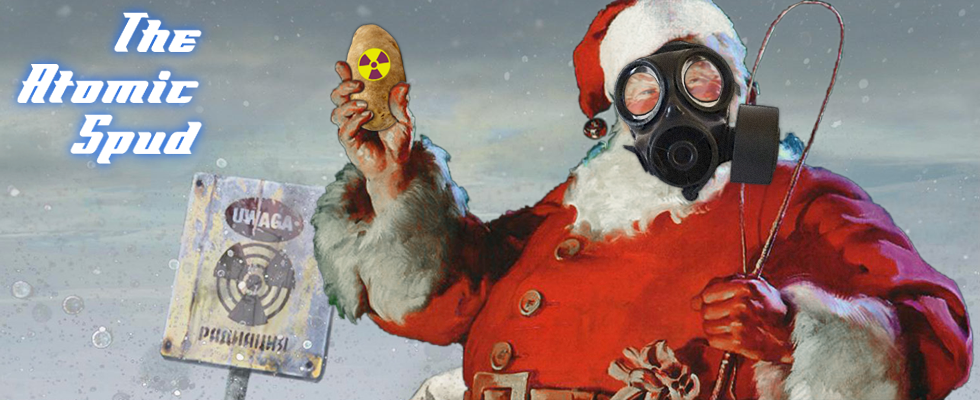Today was my last day of work before our company's holiday shutdown. Apparently it was realized years ago that too many employees take vacation during the week between Christmas and New Year's for the facility to be effective. The shutdown consists of three paid holidays (Christmas Eve, Christmas, and New Year's) with four mandatory vacation days in between.
While being mostly alone in the office and left to my own thoughts, I started thinking about what I should write for my annual "Happy Holidays vs. Merry Christmas" screed. I was going to mention that Happy Holidays is an exclusive rather than an inclusive phrase. That is, it isn't truly a greeting for an amalgamation of holidays but rather a counterfeit that's clearly intended to replace "Merry Christmas". For example, I've often noticed that Menorahs (which are explicitly religious symbols, as opposed to the Christmas tree) and "Happy Hanukkah" are allowed to stand proudly (which they should), while the very word Christmas has become verboten (many a city's official Christmas tree has instead been given the absurd title of "Holiday Tree").
I was even going to bring up how the attempt to phase out the word "Christmas" seems downright Orwellian. In George Orwell's 1984, the Party attempts to control citizens' thoughts through "Newspeak"; a language that supposedly seeks to eliminate "unnecessary" words but is actually intended to abolish "incorrect" concepts from the people's vocabulary and encourage "correct" (i.e., Party-approved) thinking.
Lo and behold, it turns out that I already wrote this diatribe last year:
However, a lot of us don't see the proliferation of "Happy Holidays" as an inclusive practice, but as one that has been deliberately and successfully pushed by certain culturally and politically influential entities to be exclusive of Christianity or any of its outward trappings. It represents one of the earliest and most subtle attempts of the militantly secular (and often explicitly anti-Christian) to strip Christmas of its meaning and origin. Note that no other widely celebrated holiday is considered so unacceptable by the purveyors of political correctness that it is being stripped of its name in a manner that would make Orwell's Ministry of Truth proud.Well, on to the next topic then.
Elf on the Shelf is Creepy
My wife, a big Pinterest fan, recently introduced me to the concept of the Elf on the Shelf. Apparently the idea is that a family keeps an elf doll in their home during the days leading up to Christmas. This doll is Santa's own little informant and tells the jolly fat man whether or not the children should be on the naughty or nice list.
The official site for Elf on the Shelf says that the elves like to play games with the family, often by hiding in different places throughout the house. Some of the more creative people on Pinterest have also added mischief and pranks to their elf's repertoire.
Although this seemed interesting at first, it got weirder as I thought about it. First of all, the idea of having one of Santa's agents spying on you is a bit too "Big Brother" for me (speaking of Orwellian...). "Dear St. Nick: I'd like to skip the presents this year and keep my privacy. Please call off your spy."
Second of all, look how creepy this elf is:
 |
| Oops, wrong elf. I bet he would keep the kids in line, though. |
 |
| "I can see into your soul" |
Sure, it looks cute at first. But imagine this creepy little thing scurrying around your house. It could be watching you at this very moment... and judging you.
I'm sorry, but the magical and/or possessed doll is a horror staple. (Do we all remember the Twilight Zone's Talky Tina? "My name is Talky Tina and I don't think I like you.") And how does this elf doll become magical? According to the website:
The tradition begins when Santa sends his scout elves out to Elf Adoption Centers. Waiting for their families to bring them home, these patient elves hibernate until their family reads The Elf on the Shelf, gives their elf a very special name, and registers their adoption online. Once named, each scout elf will receive its Christmas magic and become a part of the family’s Christmas each and every year.So, you have to read the book, name the elf, and register its adoption online for it to get its Christmas magic? Again, the stories I'm familiar with have taught me that reading a book to bestow life on something never turns out well, although The Elf on the Shelf doesn't seem like the typical eldritch tome of forbidden lore needed for this kind of thing. Now maybe if it was called The Necronomicon of St. Nicholas and was bound in human skin... Anyway, giving it a name makes sense, since that's often part of bringing an unnatural horror to life, but why do you also have to register the adoption online to finish the process? I really can't see online registration as being the key to unlocking magical powers. And why would you deliberately grant magical powers to a being whose sole purpose is to spy on you?
The whole thing just seems wrong to me. However, if Bride of Atomic Spud decides to get one next year, you better believe that I'll take advantage of all its inherent creepiness and our children will know true terror... uh, I mean the magic of a new Christmas tradition.
A Christmas tradition... of terror.
